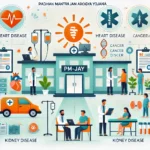The Role of Community Organizations in Assisting Applicants of the Delhi Pension Scheme
Community organizations, including NGOs, self-help groups, and local collectives, play a vital role in bridging the gap between government schemes and beneficiaries. Their involvement is crucial in ensuring that eligible women can access the Delhi Pension Scheme to Women in Distress effectively.
Awareness and Outreach
Many eligible women remain unaware of their rights under the Delhi Pension Scheme due to limited access to information. Community organizations help by:
- Information Dissemination: Conducting workshops, distributing pamphlets, and using local media to inform women about the scheme’s benefits and eligibility criteria.
- Door-to-Door Campaigns: Volunteers visit households to identify potential beneficiaries and provide personalized guidance.
- Social Media Engagement: Using digital platforms like WhatsApp groups and Facebook to spread awareness among communities.
Application Assistance
Applying for government schemes can be a daunting process for many women, especially those lacking digital literacy or access to documentation. Community organizations step in by:
- Document Preparation Support: Helping women gather and prepare necessary documents such as residence proofs, income certificates, and marital status documents.
- Digital Facilitation: Assisting applicants in navigating the online application process on the e-District Portal, ensuring timely submissions.
- Form Filling and Submission: Organizing camps where volunteers help women fill out and submit their applications correctly.
Advocacy and Liaison
Community organizations act as intermediaries between the government and beneficiaries, ensuring smooth processing and policy advocacy.
- Policy Advocacy: NGOs collaborate with government agencies to push for inclusive policies and enhancements in the scheme.
- Liaison with Government Officials: Community representatives help resolve application issues by liaising with district authorities and pension officers.
- Escalation of Grievances: If applications are delayed or rejected unfairly, organizations assist in filing grievances and appeals.
Capacity Building and Financial Literacy
To ensure long-term benefits, organizations also work on empowering women financially and socially.
- Financial Planning Workshops: Educating beneficiaries on managing their pension funds effectively.
- Skill Development Training: Providing vocational training to help women attain self-sufficiency beyond pension reliance.
- Legal Awareness Programs: Informing women about their legal rights, particularly in cases of abandonment or domestic issues.
Case Study: Impact of Community Support in Pension Enrollment
An NGO operating in Delhi’s resettlement colonies conducted a month-long pension awareness drive. As a result:
- Over 2,000 women were successfully guided through the application process.
- 85% of applicants received approval within 3 months due to proactive document submission.
- Many women, previously unaware of their eligibility, now benefit from a stable monthly pension.
Challenges Faced by Community Organizations
Despite their positive impact, community groups face several hurdles, such as:
- Limited Resources: Many NGOs operate with restricted funding, making large-scale outreach difficult.
- Bureaucratic Delays: Slow processing times and red tape hinder effective implementation.
- Digital Barriers: Many applicants lack smartphones or internet access, making digital applications challenging.
Conclusion
Community organizations play an indispensable role in helping women access the Delhi Pension Scheme, from raising awareness to guiding applications and ensuring timely processing. Strengthening partnerships between the government and these organizations can enhance outreach, streamline applications, and provide more effective support to women in distress. By leveraging community-driven efforts, the Delhi government can ensure that every eligible woman receives the financial assistance she deserves.




